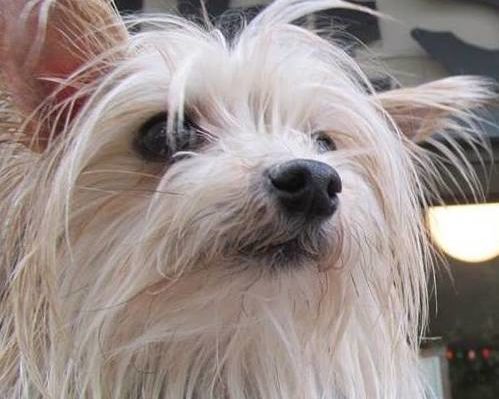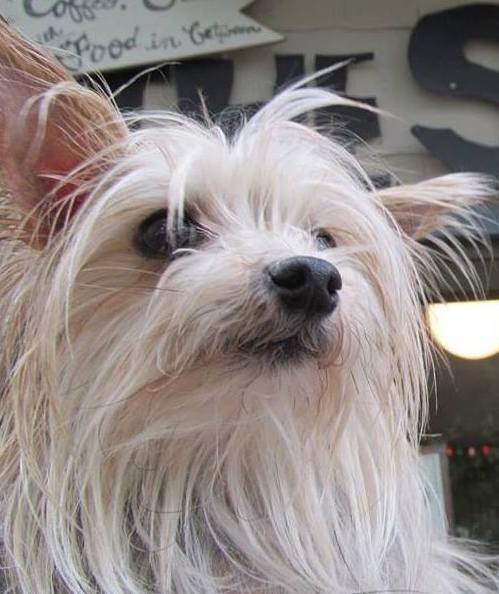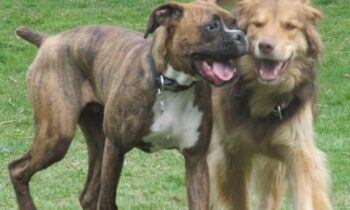
Four lanes of traffic on a busy thoroughfare not far from home. I thought it was a squirrel.
I couldn’t understand why cars were stopping until I looked again.
It was not a squirrel.
Against the curb on the far side of the street, the small animal huddled—frozen with fear. I checked behind me as I opened my door. I got a nod from that driver. The truck in the next lane also stopped, acknowledged me. I saw no other volunteers.
I walked in front of the truck, checking the lane between me and the curb. All vehicles I could see were stopped and waiting. I swallowed hard and stepped closer.
I called and clapped my hands.
That didn’t work.
Then I remembered that I am a dog trainer.
I turned sideways, knelt down, called again.
It didn’t run to me . . . but it didn’t run away.
I scooped it up, tucked it under my arm.
I held it tightly and headed back to my car.
It was a dog—a very tiny, scruffy, smelly dog.
I didn’t know then that I was going to keep her. I saved her from that busy street because I was there and no one else was going to do it. I fully expected that she had a home and a family. I was quite sure I’d be returning her to them soon.
I was wrong.

Photo by Val Hughes
I listed her with all three local shelters. I volunteered to keep her until she was claimed. I went next door to ask my neighbor how much kibble she fed her miniature schnauzer daily, as I had never housed a dog as small as this one. I gave her about a third of what the schnauzer’s ration was.
Two weeks later, she still had not been claimed.
I’d always thought I’d like to have a small dog—a small dog who could play Toto in Wizard Of Oz, to be specific! I’d trained and handled a 20-pound miniature schnauzer playing the part, and I knew how heavy he’d been for the young actress playing Dorothy to hold while she was dancing. I thought that this little rascal, who had the Toto look, might be a much better size . . . to be held while dancing!
I adopted her.
I took her to my veterinarian for a check-up and, after it was determined she’d not been neutered, I had her spayed and microchipped. They thought she might have had puppies but couldn’t be sure. She was a mix of Yorkshire terrier and powderpuff Chinese crested, and she weighed five pounds. The veterinarians estimated her age at that time to be between one-and-a-half and two years old.
She fit in well with the two golden retrievers I had then. Later, she adjusted easily to the addition of a cat to our household.
And she did play the part of Toto! Twice, in fact, as she performed with two different casts of small children who were enrolled in a kids’ drama academy at our local civic theater. Years later, she had a small role in the main-stage production of Gypsy, playing Chowsie, the pet dog of the show’s stars. She enjoyed the experience immensely, and so did I!
I realized not long ago, thanks to Facebook memories and a birthday card from our vet clinic, that it has been 16 years plus since I found her in the street, since I decided to adopt her, since she became a family member—which means that she is now about . . . 18 years of age.
That is very old for a dog!
I did not plan to have a dog that old when I decided to keep her. If she were human, she would be old enough to become an independent person, to move away from home, to go away to college!
Instead, she is becoming more dependent every day.
She has lost both sight and hearing . . . not completely, but progressively more and more, to the point that it’s easier for me to tell what she can’t see and hear than what she can. Luckily for us all, she is old but otherwise healthy—a little stiff, uncertain of her footing especially in poor lighting, hesitant but determined. She is part terrier, so she’s tenacious. She eats voraciously and still loves treats.
My veterinarian gave me some excellent advice when I first brought her to the clinic. He told me that the two major killers of dogs her size are bad teeth and jumping or falling off “too high” places. She had 17 teeth removed some years ago, leaving as many as possible. Several are slightly loose, but she manages very well anyhow. I give her soft treats and I soak her kibble into gruel.
The only “too high” place to which she has access is the bed, where she is allowed to sleep and hang out, along with our other dog (the 55-pounder) and our cat (12 pounds). She has until recently been able to jump up onto the bed on her own, as long as there is a rug on the hardwood floor for traction. She used to jump off without assistance as well, but I taught her many years ago to allow me to lift her off instead. I place her on the rug next to the bed and she takes off on her own from there.
Lifting her off is made easy and safe by the “feedback” I have given her. She is never put down on the floor if she is struggling. If she struggles—wiggles, pulls away—I hold still right where I am. She is put down only when she is quiet and relaxed. Since what she wants is to be put down, she’s rewarded by being put down when she cooperates with the lifting by not struggling. It’s become habit.
Teeth and “high places” covered, within reason!
Loss of sight has not been a major problem for her because she’s lived in the same house, with the same set-up—same stairs, same doors, same bed, same spot to eat, same back yard—for 16 years now. She has a good map in her mind of where she wants to go and how she’s going to get there. Put something in her way, though, and she can be thrown off track. I try to push anything that might be “out of place” against a wall, like the vacuum cleaner or a laundry basket. On her own, she’s found some spots where she can be “out of the way” and not in danger of being trampled by me or by any larger animal who might be in the room. She knows exactly where she eats!
Loss of hearing is maybe more apparent as a problem to me. (It’s clearly not a problem for her.) She cannot hear herself bark, I’m guessing, at least not as well as before . . . so she just barks louder! I call it her baby eagle imitation. In inclement weather, or if she just thinks I’m taking too darn long, she squawks her little head off on the back steps until I come and let her in. It’s a loud and awful sound!
I’ve learned a lot about living with an aging dog who’s losing both sight and hearing. She’s a good teacher. I realize now that, with those senses fading, I’m not able to communicate as well with her—now, when she probably needs it the most. I regret not teaching her some things when she had all her senses, and I’m trying to work out how best to teach her some new skills she must use now.
Next week, I’ll share some of those solutions for living safely and happily with a very old dog!



